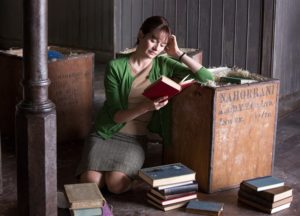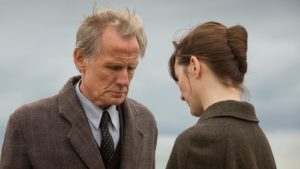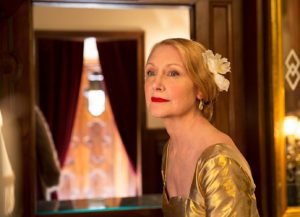Florence Green, the widowed heroine of THE BOOKSHOP, is a woman of patience, determination, and kindness. Qualities that would stand anyone in good stead, they are enough to get her dream of opening the eponymous entity in this evocative adaptation of the Penelope Fitzgerald’s novel. Whether they will be enough to keep it going in the aptly named small seaside town of Hardborough, Suffolk forms the dramatic arc of this quietly devastating film about small towns, big dreams, and fighting impossible odds.

Emily Mortimer
Florence, played with impish reserve by Emily Mortimer, is a relative newcomer to Hardborough in 1959 when she lays eyes on The Old House, a derelict building with a shabby charm, and sees the future home of the bookshop she wants to open. As a lover of books, trained in the art and the craft of selling them, the idea of bringing a bookshop to a town that has been without one for many years seems like a proposition that will be mutually satisfying for all concerned. Unfortunately, no one told her that the imperious local grand dame, Violet Gamart (Patricia Clarkson) has other plans for the building, and so begins a battle of wits, words, and social influence that will eventually force the entire town to take sides.
The tension between Florence and Violet grows even as Florence’s relationships with the locals flourishes, more or less. The curiously inscrutable relationship between local celebrity Milo North (James Lance) that drifts between sympathetic accord and barely concealed contempt, plays out in the subtlest of expressions and body language that reveal the subtext at work beneath an impeccably civil veneer. It’s in high contrast to the bluff welcome of the locals, from the Sea Scouts who volunteer to help her set up bookshelves, to Christine (Honor Kneafsey), the preternaturally direct and self-assured little girl with wild hair who hates reading but thoroughly enjoys tending to Florence’s stock and customers). Then there’s Edmund Brundish (Bill Nighy), the recluse ensconced in a decaying mansion outside of town, and whose absent wife has been the topic of local gossip for decades. So opposed is he to interacting with other humans that he rips the author portraits from his beloved books and burns them. Hence, he sends messengers to Florence’s shop rather than visit in person with his requests for novels about bad people, biographies of good people, no poetry, and as much Ray Bradbury as she can provide.

Bill Nighy, Mortimer
Filmmaker Isabel Coixet rightly dwells on the details in this perfectly realized character study. The uncertain neck fastening of Florence’s red dress worn to the swanky party Violet throws, which becomes the least of the former’s woes as the evening progresses. The way Violet’s serene exterior gives way to a fierce but silent clutching of her skirt’s fabric after a particularly unpleasant, though, again, impeccably civil, conversation. Ripped paper that trails through the air with breezy defiance. Especially good is the way she presents people caught up in a good book, no easy task if you think about it, but catching the expression on people’s faces, the way they have given themselves over entirely to the contents of the printed page is an homage to reading, and the necessity of becoming lost in a good book. And books are what finally bring Edmund back into the world, if only with an invitation to tea proffered to Florence. Nighy has never given a more moving performance, and few others have. His whispery voice crackling with dry humor and deep feeling, he has made his eyes infinitely kind in a face that is set in stern lines, and with a manner that has grown unaccustomed to interacting with others in a meaningful way. There is a melting tenderness in his longing to be at ease with others, and his inability to recover that lost art.

Patricia Clarkson
The voice-overs in THE BOOKSHOP annotate rather than irritate as they usually do, and provide the sort of narrative that only a book can offer. In return, there are haunting visuals that do what a printed page couldn’t, allowing us to study the porcelain heartlessness of Violet, or the power of Florence’s memory that can almost bring the dead back to life. Unexpectedly inspiring for its celebration of courage, and its ability to affect lives over both time and space, THE BOOKSHOP will make you want to pick up a book, and start talking up Bill Nighy for an Oscar™.
Perfect for this bookie and Anglophile.
One of the very few critics who actually got it…